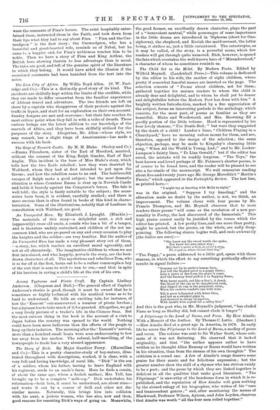The Child Set in the Midst. By Modern Poets. Edited
by Wilfrid Meynell. (Leadenhall Press.)—This volume is dedicated by the editor to his wife, the mother of eight children, whose pretty if somewhat fanciful names are inserted on the page. The selection consists of " Poems about children, not for them ; gathered together for mature readers to whom the child is already dear and delightful, and to whom he shall yet be dearer and delightfuller before the Modern Poet has done with him." A brightly written Introduction, marked by a fine appreciation of the subject, forms an interesting prelude to the anthology, which consists, for the most part, of poems as familiar as they are beautiful. Blake and Wordsworth and Mrs. Browning fill a goodly portion of the little volume. Hood is represented by his four lovely stanzas, " The Death-Bed ; " but were they suggested by the death of a child ? Landor's lines, " Children Playing in a Churchyard," have no meaning unless meant for them, and are, therefore, opposed to the design of the selection ; the same objection, perhaps, may be made to Kingsley's charming little song, " When All the World is Young, Lad ;" and to Mr. Locker- Lampson's dainty lines, "To Lina Oswald ;" but if the editor has erred, the mistake will be readily forgiven. " The Toys," the best-known and loved perhaps of Mr. Patmore's shorter poems, is of course to be found here, and the reader will be pleased to see also a fac-simile of the manuscript. We well remember reading about five-and-twenty years ago Mr. George Meredith's " Martin's Puzzle," which appeared in the Fortnightly Review. The last line, as printed here,- • ' I might try at kneeling with Molly to-night," was in the original. " Suppose I try kneeling," and the alteration made no doubt by the author, is not, we think, an improvement. The volume closes with four poems by Mr. Francis Thompson, and Mr. Meynell observes that to most readers these poems " will come as the revelation of a new per- sonality in Poetry, the last discovered of the Immortals." This high praise cannot easily be justified by the verses which the editor has printed. A few pretty lines, and one more than pretty, might be quoted, but the poems, on the whole, are sadly disap- pointing. The following stanza begins well, and ends awkwardly (the italics are ours) :— " She knew not the sweet words she spake, Nor knew her own sweet way;
But there's never a bird, so sweet a song,
Th oeged in whose throat that day."
" The Poppy," a poem addressed to a little girl, opens with three stanzas, in which the effort to say something poetically effective results in signal failure :—
" Summer set lip to earth's bosom bare, Aud left the flushed print in a poppy there; Like a yawn of fire from the grass it came, And the fanning wind puffed it to flapping flame.
With burnt mouth, red like a lion's, it drank The blood of the sun as he slaughtered sank, Aud dipped its cup in the parpurate shine, When the eastern conduits ran with wine.
Till it grew lethargied with fierce bliss, And hot as a winked gipsy is, And droused iu sleepy savageries, With month wide a-pont for a sultry kiss."
And this is the poet who, in Mr. Meynell's judgment, "has eluded Fame as long as Shelley did, but cannot elude it longer"!


















































 Previous page
Previous page